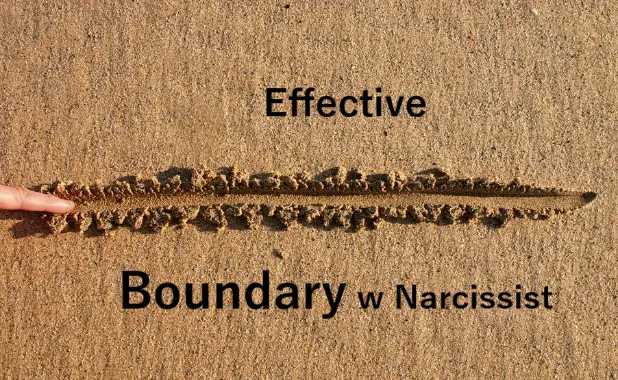What Happens When a Narcissist Hits an Effective Boundary
When setting a boundary with a narcissist, expect it to be challenged as a matter of course.
A narcissist finds boundaries intolerable because they lose control. Once you understand you are dealing with a covert narcissist, you must set clear boundaries to protect yourself.
But how do you know if you have an effective boundary? What happens when a narcissist hits an effective boundary? You can expect a response–that’s what is in the playbook. What responses should you expect when a narcissist hits an effective boundary?
Narcissists Complain, Criticize, and Lie
Effective boundaries with narcissists are the standard of care. They are firewalls.
As you divorce the covert narcissist, you find yourself re-establishing boundaries over and over again. Establishing a small boundary is often the first sign of problems in the relationship. They are important in your decision to leave and go without contact.
Narcissists complain, criticize, and lie. That’s just what they do. You have effective boundaries to protect yourself and your children.
Boundaries do not control their behavior; they control your behavior as you do something in response to their boundary violation. If you say you are going to walk away, walk away.
Because narcissists must control everyone around them, they push boundaries either overtly or passive-aggressively.
Not having control is intolerable to a narcissist. How do they respond?
Common Response to Boundary Hits
Let’s look at this response as an example of when a narcissist hits an effective boundary.
“I believe your selfish decision has damaged the marital estate and that there will be penalties”
This is a good example of criticism and projection followed by grandiosity and a threat.
Narcissists respond with criticism, projection, and threat.
Note the projection (calling your audacity to attempt to stop their control of you ”selfish” when they are the self-centered one). Next, they deserve all of their money and all of your money. What is his is his, and what is mine is his. The marital estate is shorthand for everything he thinks he deserves since he deserves everything (grandiosity), and you deserve punishment. See, he even said there would be penalties!
As you can see, criticism via projection and a threat (which is what they think you deserve anyway) indicates that you have an effective boundary against a narcissist.
Setting Boundaries with a Toxic Ex: Why Their Negative Reactions Are a Sign You’re Doing it Right in Your High Conflict Divorce or Child Custody Case
However, when you set boundaries with a toxic ex, it is almost inevitable that they will try to gaslight, manipulate or guilt-trip you into giving up your boundaries. They may accuse you of holding grudges, being selfish, or not caring about others. This can make it incredibly hard to stick to your boundaries and maintain your resolve.
You’re Doing It Right!
Which Facade to Wear?
Which boundary should you test? Here is “What to Expect When Setting Boundaries:”
Setting firm boundaries with somebody who has narcissistic personality disorder may trigger them into cycling through their behavior. Be prepared for them to:
- Act like a victim
- Argue with you
- Blame you or make things seem like your fault
- Accuse you of being too sensitive
- Minimize your feelings
- Become angry
Other Common Responses to an Effective Boundary
Other common responses:
- guilt-tripping
- disregarding the boundary (oh, I forgot!)
- disregarding the boundary and then gaslighting you (oh, you were serious about that? That’s crazy)
- undermining your credibility
- foment the flying monkeys
- enriching the smear campaign
- the ever-popular silent treatment
- withhold love
- withhold loving
- or if you are very unlucky, you might get hoovered again.
Rare
This can rarely lead to narcissistic rage, which feels like an age-appropriate tantrum depending on her age of inner child wounding (2.5-4 years or 6-10 years). Discard is also possible and may take the form of blowing up bridges (saying you called a divorce attorney just for the reaction).
Other forms of overt punishment are dog whistling, devaluing, gaslighting, playing the victim, and, occasionally, just giving in because they know they are being tested.
Effect of Effective Boundaries
A negative response from a narcissist means you have an effective boundary that prioritizes the well-being of your children. Stand up for yourself and your legal rights.
Boundaries are not about punishment or getting revenge. They are about creating a healthy environment for yourself and your children. Boundaries establish clear and consistent rules that everyone must follow for a healthy relationship.
When you set boundaries, expect pushback, punishment, and being called selfish. Still, keep doing what is best for your family. Stay firm in your boundaries; keep the manipulations away.
